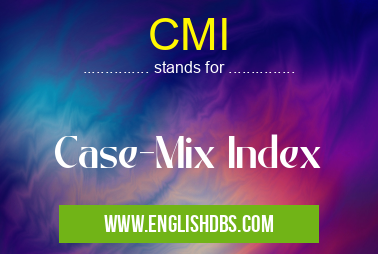What does CMI mean in GERIATRIC
Case-Mix Index (CMI) is a value that reflects the relative complexity and resource consumption of a patient's medical condition. It's a measure used in healthcare systems, particularly in hospital settings, to categorize patients based on their clinical characteristics and resource utilization. The CMI is crucial for healthcare planning, resource allocation, and reimbursement.

CMI meaning in Geriatric in Medical
CMI mostly used in an acronym Geriatric in Category Medical that means Case-Mix Index
Shorthand: CMI,
Full Form: Case-Mix Index
For more information of "Case-Mix Index", see the section below.
### CMI Meaning in MEDICAL: In a medical context, CMI refers to a numerical value assigned to a patient's hospital discharge record. It represents the average cost and resource consumption associated with treating a patient with similar clinical characteristics. The CMI is calculated using a classification system, such as the Diagnosis-Related Groups (DRGs), which assigns patients to specific groups based on their diagnosis, procedures, and other factors.
### CMI Full Form: The full form of CMI is Case-Mix Index.
### What does CMI Stand for: CMI stands for Case-Mix Index.
Essential Questions and Answers on Case-Mix Index in "MEDICAL»GERIATRIC"
What is Case-Mix Index (CMI)?
CMI is a measure used in healthcare to adjust for the severity of illness or complexity of care provided to patients. It is calculated based on the patient's diagnosis, procedures, and other factors that reflect the resources required to treat the patient. By using CMI, healthcare providers can compare the cost and quality of care provided to different patients, even if they have different medical conditions.
How is CMI calculated?
CMI is typically calculated using a statistical model or algorithm that assigns a weight to each diagnosis, procedure, and other factor based on their relative severity or resource consumption. The weights are then multiplied by the number of occurrences of each factor for a given patient, and the sum of these products is the patient's CMI.
What is the purpose of using CMI?
CMI is used for various purposes in healthcare, including:
- Adjusting for differences in patient severity when comparing costs or quality of care between different providers or hospitals.
- Identifying patients who may require additional resources or specialized care.
- Developing payment systems that are based on the complexity of care provided.
- Evaluating the efficiency and effectiveness of healthcare services.
What are the limitations of using CMI?
While CMI is a useful tool, it has some limitations:
- It may not fully capture all aspects of patient severity or complexity of care.
- It can be influenced by coding practices and the accuracy of medical records.
- It may not be applicable to all types of healthcare settings or patient populations.
Final Words: CMI plays a vital role in healthcare systems by enabling comparisons between patients and providing a standardized measure of case complexity. It assists hospitals in predicting resource needs, estimating costs, and ensuring appropriate reimbursement. Understanding the concept of CMI is essential for healthcare professionals, administrators, and policymakers involved in healthcare planning and resource allocation.
CMI also stands for: |
|
| All stands for CMI |
